|
|
 |
|
Robert Krulwich
Praised as "the most inventive network reporter in television" by TV Guide,
NOVA scienceNOW host and executive editor Robert Krulwich got his start with
Pacifica Radio. From there he moved to NPR's "All Things Considered" for a
famously creative stint as a business and economics reporter, then successfully
translated his unique reporting style to CBS "This Morning" in 1984 and to ABC
News a decade later. Krulwich returns frequently to PBS, notably to Frontline
and recently as host of NOVA's "Cracking the Code of Life," an award-winning
two-hour program on the human genome. Krulwich received a bachelor's degree in
U.S. history from Oberlin College and a law degree from Columbia Law School. He
lives in New York City with his wife and two children.
|
Fuel Cells

|
|
Nate Lewis
Nate Lewis, a professor at the California Institute of Technology, studies the
use of materials in solid-liquid junctions to improve their conversion of
sunlight into stored electrical and chemical fuels.
|
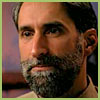 |
|
Dan Nocera
Dan Nocera is the W.M. Keck Professor of Energy and Professor of Chemistry at
MIT. His research group focuses on the mechanisms of energy conversion in
chemistry and biology. One of his current projects focuses on the potential of
solar energy schemes to produce alternative fuels like hydrogen.
|
RNAi
 |
|
Gregory Hannon
Gregory Hannon is a researcher on the forefront of the field of RNA
interference, a powerful new tool for gene analysis, discovery, and
suppression. He works on RNA biology and cancer biology at Cold Spring Harbor
Laboratory in Cold Spring Harbor, New York, where he is also a professor.
Hannon's particular focus is cancer development and the potential for using
RNAi against cancer. He received a B.A. in biochemistry and a Ph.D. in
molecular biology at Case Western Reserve University in Ohio. Hannon was
selected as a Howard Hughes Medical Institute investigator in 2005.
|
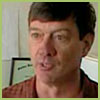 |
|
Richard Jorgensen
Richard Jorgensen accidentally discovered post-transcriptional gene silencing
while working on the genetic modification of color in ornamental plants. He is
currently an associate professor at the University of Arizona, where he studies
RNA silencing mechanisms in plants.
|
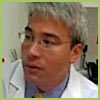 |
|
Peter Kaiser
Peter Kaiser is an ophthalmologist at the Cleveland Clinic Cole Eye Institute
who specializes in macular degeneration and other retinal diseases. Kaiser has
been a principal investigator in numerous national clinical trials, including
the recent treatment of age-related macular degeneration using RNAi.
|
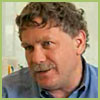 |
|
Eric Lander
Eric Lander is the founding director of the Broad Institute of MIT and Harvard.
One of the leaders in the Human Genome Project, Lander continues to promote an
understanding of human genetics and the basis of disease. He has served on the
boards of numerous government agencies, corporations, academic institutions,
and scientific societies.
|
Fastest Glacier
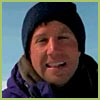 |
|
Peter Standring
Peter Standring is a NOVA scienceNOW correspondent. For over a decade,
Standring has traveled the globe as a broadcast reporter, working most recently
for the National Geographic Channel. His award-winning pieces have explored a
wide range of topics, including the endangered mountain gorillas of Uganda,
voodoo culture in West Africa, the volcanoes of Iceland, and medicine men in
the Amazon basin. Standring completed his undergraduate studies in English and
French at Connecticut's Fairfield University, and he earned an M.S. in
Broadcast Journalism at Boston University's College of Communication.
|
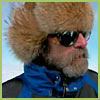 |
|
Konrad Steffen
Konrad Steffen is Director of the Cooperative Institute for Research in
Environmental Studies at the University of Colorado Boulder, where he is also a
Professor and Fellow. A climatologist, he has spent an average of seven weeks
in the high Arctic every summer for the past three decades. He studies
processes related to climate and cryosphere interaction in polar and alpine
regions based on in-situ and satellite measurements, and he uses climate system
modeling to study their sensitivity.
|
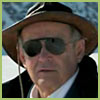 |
|
Jay Zwally
Jay Zwally is a glaciologist with NASA based at the Goddard Space Flight Center
in Greenbelt, Maryland. He studies the growth and shrinkage of the Greenland
and Antarctic ice sheets and polar sea ice and the effects of changing climate.
Zwally is Project Scientist for NASA's ICESat satellite, which uses lasers to
measure changes in the thickness of ice to fractions of an inch. In the region
of the Jakobshavn Isbrae glacier in Greenland, he led the discovery of how the
ice flow accelerates in summer as the melting has been increasing.
|
Profile: Brothers Chudnovsky
 |
|
Barbara Bridgers
Barbara Bridgers has been General Manager for Imaging and Photography at The
Metropolitan Museum of Art in New York since 1985. In 1996, she began
overseeing the Museum's transition to a fully digital imaging and printing
laboratory. Bridgers and her staff are working to produce digital images of
every work of art in the Met's enclyclopedic collection. She was responsible
for putting together the team that worked on the unicorn tapestries.
|
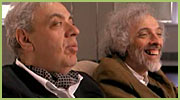 |
|
David and Gregory Chudnovsky
David and Gregory Chudnovsky are New York mathematicians, both born in Kiev,
who were asked to piece together the 200 CDs worth of digital photos of the
unicorn tapestries. Aside from their numerous publications, the brothers are known
for breaking several world records in the late 1980s using their homemade parallel
supercomputer in the global race to calculate pi to the most digits. They tired of
it after calculating past eight billion decimal places. They currently are directors
of the Institute for Mathematics and Advanced Supercomputing at Brooklyn Polytechnic
University. Gregory was in the first batch of MacArthur prize fellows.
|
 |
|
Chad Cohen
Chad Cohen comes to NOVA scienceNOW after nearly four years as a science
correspondent and producer for the National Geographic Channel. He has searched
for lost cities under the slums of Cairo, juggled weightlessness and nausea in
NASA's "vomit comet," and, most recently, was charged by an Asian one-horned
rhino while he was investigating India's wild elephants.
|
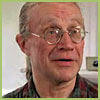 |
|
Tom Morgan
Tom Morgan is a doctoral candidate in mathematics at Brooklyn Polytechnic
University's Institute for Mathematics and Advanced Supercomputing, studying
under the Chudnovskys. Tom is pursuing a Ph.D. in math after a 30-year career
in information technology, most recently as chief technologist for a Fortune
500 company.
|
|
|
|
|
|
|


